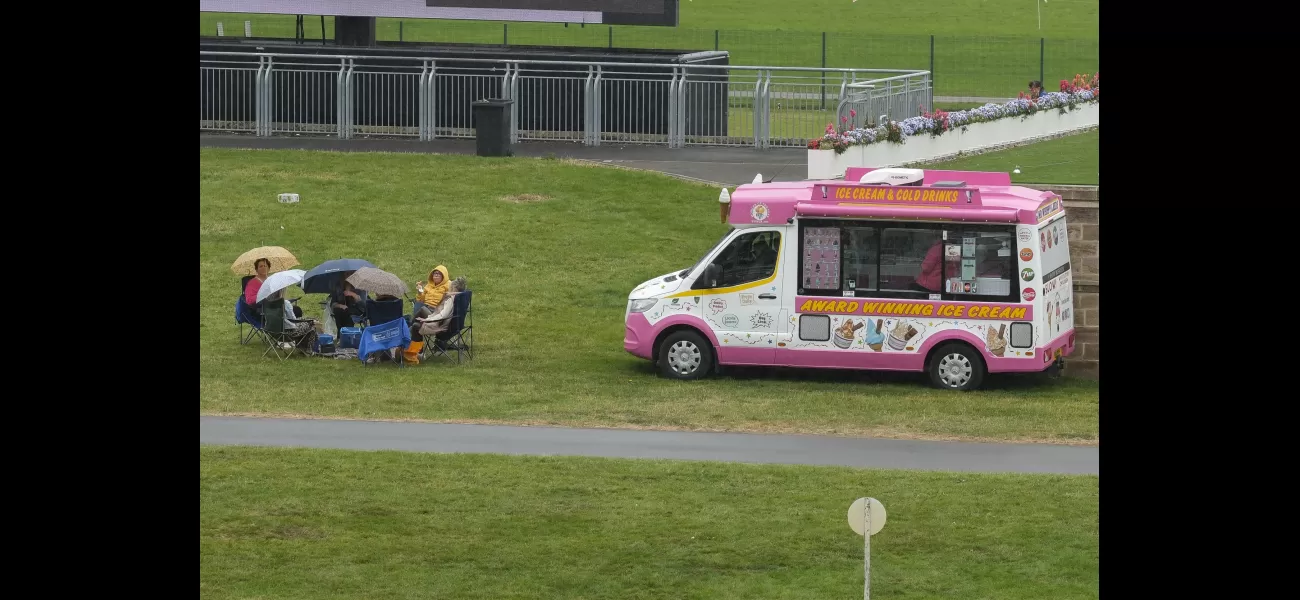UK's summer weather caused something unseen in three years due to extreme conditions.
There's a chance of sunny weather ahead.
August 28th 2024.

The weather at York Racecourse on August 22 was definitely not ideal for enjoying a nice scoop of ice cream. It seems that our grumpy attitudes towards this summer's weather were justified, as statistics now confirm that it was mostly rubbish. In fact, the relentless rain had such a negative impact on the UK's economy that prices in shops actually dropped for the first time in almost three years. This resulted in the lowest rate of growth since October 2021.
The excessive amount of rain caused a period of deflation after years of rising prices. According to the British Retail Consortium - NielsenIQ Shop Price Index, shop prices in the first week of August were 0.3% lower than the previous year. Helen Dickinson, the chief executive of the BRC, attributed this decrease to a lack of sunny days and people's reluctance to go out and shop, especially for seasonal items. She also mentioned that retailers had to heavily discount their summer stock, particularly for fashion and household goods, due to the difficult summer of trading.
On July 2, spectators at the 2024 Wimbledon Championships had to seek shelter from the rain, which caused play to be stopped. However, food prices were not affected by the weather and actually went up by 2%. On the other hand, items like clothes, footwear, and electronics saw price reductions. It's possible that those shelves of flip flops didn't look as appealing when there were yellow weather warnings for the tail end of a hurricane. Overall, this summer wasn't particularly sunny, despite a few nice and even hot days.
But don't lose hope for some last-minute sunshine! A spell of warmer weather is on the way, with temperatures expected to reach 29°C in the southeast and plenty of sunshine for England and Wales.
Now, let's delve into the concept of inflation and what happens when it rises. Inflation refers to a general increase in the prices of goods and services, while the opposite, deflation, refers to a decrease in prices. For example, if the cost of a £1 bag of flour rises by 5p, then there is a 5% inflation rate for flour. This applies to services as well, such as haircuts. Low pressure will continue to dominate the UK for the next couple of days, but things will start to improve from Thursday as high pressure builds from the south, leading to a pleasant end to the week.
According to the BRC, fresh food inflation slowed to 1% in August, with the biggest monthly decrease seen in fruit, meat, and fish prices since December 2020. However, ambient food inflation, which includes products that can be safely stored at room temperature, remained stubborn at 3.4%. Ms Dickinson stated that retailers are working hard to keep prices down and that households will be pleased to see some goods falling into deflation. However, there is uncertainty about future commodity prices due to the impact of climate change on domestic and global harvests, as well as rising geopolitical tensions. This could potentially lead to renewed inflationary pressures in the coming year.
Mike Watkins, head of retailer and business insight at NielsenIQ, mentioned that many food retailers introduced price cuts to boost sales during the "summer of sport," which included events like the Paris Olympics and Euro 2024 football tournament.
The excessive amount of rain caused a period of deflation after years of rising prices. According to the British Retail Consortium - NielsenIQ Shop Price Index, shop prices in the first week of August were 0.3% lower than the previous year. Helen Dickinson, the chief executive of the BRC, attributed this decrease to a lack of sunny days and people's reluctance to go out and shop, especially for seasonal items. She also mentioned that retailers had to heavily discount their summer stock, particularly for fashion and household goods, due to the difficult summer of trading.
On July 2, spectators at the 2024 Wimbledon Championships had to seek shelter from the rain, which caused play to be stopped. However, food prices were not affected by the weather and actually went up by 2%. On the other hand, items like clothes, footwear, and electronics saw price reductions. It's possible that those shelves of flip flops didn't look as appealing when there were yellow weather warnings for the tail end of a hurricane. Overall, this summer wasn't particularly sunny, despite a few nice and even hot days.
But don't lose hope for some last-minute sunshine! A spell of warmer weather is on the way, with temperatures expected to reach 29°C in the southeast and plenty of sunshine for England and Wales.
Now, let's delve into the concept of inflation and what happens when it rises. Inflation refers to a general increase in the prices of goods and services, while the opposite, deflation, refers to a decrease in prices. For example, if the cost of a £1 bag of flour rises by 5p, then there is a 5% inflation rate for flour. This applies to services as well, such as haircuts. Low pressure will continue to dominate the UK for the next couple of days, but things will start to improve from Thursday as high pressure builds from the south, leading to a pleasant end to the week.
According to the BRC, fresh food inflation slowed to 1% in August, with the biggest monthly decrease seen in fruit, meat, and fish prices since December 2020. However, ambient food inflation, which includes products that can be safely stored at room temperature, remained stubborn at 3.4%. Ms Dickinson stated that retailers are working hard to keep prices down and that households will be pleased to see some goods falling into deflation. However, there is uncertainty about future commodity prices due to the impact of climate change on domestic and global harvests, as well as rising geopolitical tensions. This could potentially lead to renewed inflationary pressures in the coming year.
Mike Watkins, head of retailer and business insight at NielsenIQ, mentioned that many food retailers introduced price cuts to boost sales during the "summer of sport," which included events like the Paris Olympics and Euro 2024 football tournament.
[This article has been trending online recently and has been generated with AI. Your feed is customized.]
[Generative AI is experimental.]
0
0
Submit Comment





